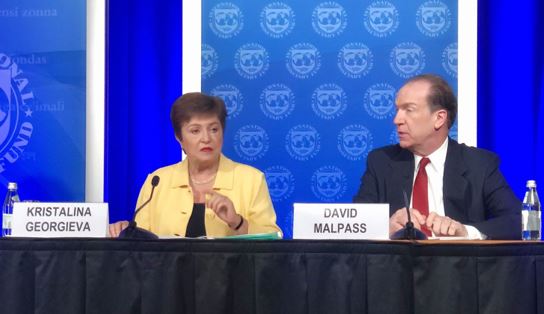
(Photo: People's Daily)
Washington (People’s Daily) -- The IMF is making available about $50 billion through its rapid-disbursing emergency financing facilities for low income and emerging market countries that could potentially seek support. Of this, $10 billion is available at zero interest for the poorest members through the Rapid Credit Facility.
IMF Managing Director Kristalina Georgieva held a joint press conference with World Bank Group President David Malpass Wednesday to address the global response and measures on coronavirus.
They made a conference call to the IMFC, the governing body representing member states to discuss the situation.
They confirmed that supply will be disrupted due to morbidity and mortality, but also the containment efforts that restrict mobility and higher costs of doing business due to restricted supply chains and a tightening of credit.
Demand will also fall due to higher uncertainty, increased precautionary behavior, containment efforts, and rising financial costs that reduce the ability to spend. These effects will spill over across borders.
According to the latest assessment, about one-third of the economic losses from the disease will be direct costs: from loss of life, workplace closures, and quarantines. The remaining two-thirds will be indirect, reflecting a retrenchment in consumer confidence and business behavior and a tightening in financial markets.
“The good news is that financial systems are more resilient than before the Global Financial Crisis. However, our biggest challenge right now is handling uncertainty,” Georgieva said.
But under any scenario, IMF forecasts that global growth in 2020 will drop below last year’s level. How far it will fall, and for how long, is difficult to predict, and would depend on the epidemic, but also on the timeliness and effectiveness of its actions.
The two organizations strongly suggested that the number 1 priority in terms of fiscal response is ensuring frontline health-related spending to protect people’s wellbeing, take care of the sick, and slow the spread of the virus. And macro-financial policy actions may be required to tackle the supply and demand shocks.
The aim should be “no regret” actions that shorten and soften the economic impact. Besides, adequate liquidity will also be needed to offset financial stability risks.
A generalized weakening in demand through confidence and spillover channels, including trade and tourism, commodity prices, and tighter financial conditions, would call for an additional policy response to support demand and ensure an adequate supply of credit.
“Maintaining the working capitals is also very important,” Malpass added.
The World Bank Group was making available an initial package of up to $12 billion in immediate support to assist countries coping with the health and economic impacts of the global outbreak.
The COVID-19 support package will make available initial crisis resources of up to $12 billion in financing, $8 billion of which is new, on a fast track basis. This comprises up to $2.7 billion new financing from IBRD; $1.3 billion from IDA, complemented by reprioritization of $2 billion of the Bank’s existing portfolio; and $6 billion from IFC, including $2 billion from existing trade facilities.
It will also include policy advice and technical assistance drawing on global expertise and country-level knowledge.
“We are working to provide a fast, flexible response based on developing country needs in dealing with the spread of COVID-19,” said Malpass. “This includes emergency financing, policy advice, and technical assistance, building on the World Bank Group's existing instruments and expertise to help countries respond to the crisis."


